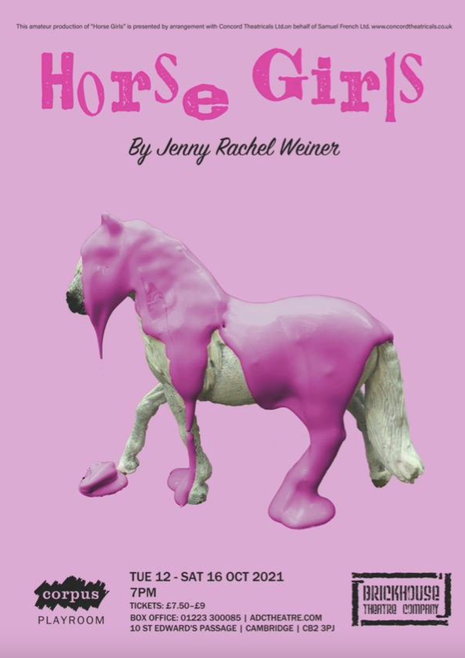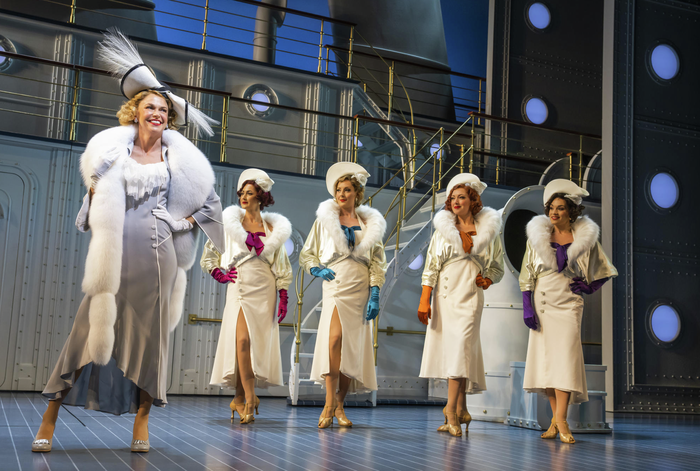‘No One Loves You Like a Horse Girl’
Innocence meets violence in Horse Girls which ran from 12th to the 16th October at the Corpus Playroom. A review by Tom Howlett

Horse Girls has everything you need: schoolgirls, violence and even a musical number. The play takes place over the course of a macabre committee meeting of the Lady Jean Ladies, the most exclusive preteen horse club in Britain, and exposes the jealousy, anger and fear that lives under the surface of each character. The play marries a traditional couple of young, innocent, protagonists and extreme violence which always proves entertaining.
The Corpus Playroom is an ideal venue for this kind of production. It is tight and intimate, making you feel confined with the girls, a fly on the wall their bizarre meeting. From the moment you enter the theatre, you become part of the play. As you step from a cold Cambridge street into the warm Playhouse you are instantly shivering again when met by the piercing gaze of Ashleigh Whitford, played by Maddie Smith, who stares you down until you find your seat. This powerful directorial choice integrates the audience into the play and adds to the uncomfortable feeling that you are slipping through the looking glass into a world very different from our own: a world where Princess Anne is god, horses are life and Ashleigh reigns supreme.
“From the moment you enter the theatre, you become part of the play”
While this play is clearly a dark comedy, with the blood, screams and violence you expect from it, the ensemble cast’s timing and charm made the comedy stand out far more. There was rarely a moment during the production where the audience wasn’t laughing at either the absurdity of the situation or the casual meanness of these young girls. The initial reveal of the girls’ age, with the line ‘in six years when I turn eighteen’, after a story about Ashleigh kissing a 22-year-old, and the subsequent laugh that followed is a perfect example of the show’s humour. Every joke was either revealing the character’s dark desires or illustrating the deeply troubling values they held. Rose Painter in particular was able to draw out the humour of all her lines and helped keep the lighter comedy of the show present even in its darker scenes.
The huge difference between the age of the characters and the actresses at first felt distracting but as the play went on it became apparent that, alongside adding to the uncanniness of the performance, it represented central theme of the narrative. The children’s desire, an almost desperate desire, to replicate adulthood. From the club’s strange bureaucracy, membership fees and job titles to each character’s repeated references to maturity this theme is laced throughout the play and well captured in performance. Maddie Smith’s performance particularly stood out in this regard; she walked the line well between a despotic, psychotic club president and insecure, vindictive 12-year-old. She was able to pivot from authoritarian speech to spoiled tantrums in a moment and acted as the main thematic representative.
“Every joke was either revealing the character’s dark desires or illustrating the deeply troubling values they held”
The most interesting aspect of the show, however, was delivered by the light and sound direction. Although possibly not as polished in some scenes as it could have been, the change in lighting to represent Ashleigh’s inner monologue and the death metal remix of “Dark Horse” perfectly represented and foreshadowed the darkness to come later in the play. The changes in lighting were profoundly effective throughout the play to signal changes in the tone and whether that came from the direction of Cara Rowland and Amy Mallows or the lighting design of Cat Salvini it is to be commended. The only criticism that you could have of it is that they didn’t use these devices more as foreshadowing. These tools could have helped to make the violent conclusion less reliant on shock value and help build tension. The abrupt violence of the climax, instead of feeling shocking, fell flat and the lack of proper build-up meant that the audience didn’t feel suitable dread leading up to it.
In reality, outside of this criticism, what carried the show was the performance of the ensemble cast. The ensemble cast, with the exception of a few scenes towards the end, barely spend a moment of the show apart. With some excellent blocking, this large group always appear dynamic on stage and fell out of the trap that often occurs in ensemble casts where the individual can often be lost in the group. Through each scene, even when speaking or singing in unison, each character was clearly defined. The best parts of the play came when you got to see girls interacting with each other and understanding the little hierarchies they all lived in.
All in all, Horse Girls was an enjoyable dark comedy that made good use of staging, excellent use of lighting/sound and was played by a delightful, twisted ensemble cast. The standout performance, unsurprisingly, came from the lead Maddie Smith, but a second mention must also go to Elizabeth Weber who, in a powerful and emotional final speech articulated the themes of the play with poise. I would also be amiss not to highly, again, Rose Painter who had me laughing for the duration. Horse Girls is a play about obsession and manipulation, one that puts the personality of a Shakespearean villain into a 12-year-old girl and revels in that absurdity. The play leaves you laughing at the uncomfortable, wincing at the dark humour and, if you sat in the front row, dripping in fake blood.
 News / Caius mourns its tree-mendous loss23 December 2025
News / Caius mourns its tree-mendous loss23 December 2025 News / Cambridge welcomes UK rejoining the Erasmus scheme20 December 2025
News / Cambridge welcomes UK rejoining the Erasmus scheme20 December 2025 News / CUP announces funding scheme for under-represented academics19 December 2025
News / CUP announces funding scheme for under-represented academics19 December 2025 News / King appoints Peterhouse chaplain to Westminster Abbey22 December 2025
News / King appoints Peterhouse chaplain to Westminster Abbey22 December 2025 Interviews / Politics, your own way: Tilly Middlehurst on speaking out21 December 2025
Interviews / Politics, your own way: Tilly Middlehurst on speaking out21 December 2025








